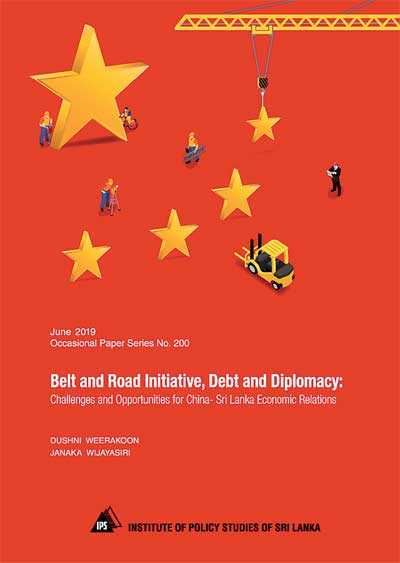Monday Feb 23, 2026
Monday Feb 23, 2026
Tuesday, 9 July 2019 00:51 - - {{hitsCtrl.values.hits}}
In Sri Lanka, emerging evidence suggests that economic relations with China are broadening to include a shift towards more Foreign Direct Investments (FDI) and trade flows. However, FDI inflows are still narrowly concentrated in less productive areas of infrastructure and mixed development projects, while bilateral trade flows are also overwhelming moving in favour of China.
Authored by Executive Director Dushni Weerakoon and Research Fellow Janaka Wijayasiri, the latest publication by the Institute of Policy Studies of Sri Lanka (IPS), ‘Belt and Road Initiative, Debt and Diplomacy: Challenges and Opportunities for China-Sri Lanka Economic Relations’ notes that China’s model of loan dispensation – a policy of not questioning national economic policies and priorities – can contribute to poor project selection and weak revenue flows that exacerbate debt build up. 
“But debt accumulation is not to the extent implied by regional and global interpretations of China’s so-called debt entrapment. The most recently available data suggest, Chinese loans are not at the core of Sri Lanka’s struggles with a high cost, and high-risk foreign debt portfolio,” the authors highlight.
What Sri Lanka’s recent experience ultimately suggests is that governments must be more accountable and transparent in sharing information on the proposed projects, not only on the terms and conditions of loan disbursements, but also on ensuring protocols on environment protection, economic feasibility assessments, population displacement, etc., are met. At the same time, if local support to engage with the BRI initiative is to be built and sustained in the long run, debt accumulation needs to be balanced with beneficial gains in trade, productivity enhancing FDI, etc. Weerakoon and Wijayasiri warn.
The authors further note that Sri Lanka has much to gain from engagement in the BRI process, as part of a larger ‘Asian pivot’ strategy to take advantage of expanding trade and capital flows. To leverage these benefits, China-Sri Lanka relations should be managed prudently without allowing it to be hijacked for political and geostrategic reasons. It also requires a serious rethink on ways and means of building a meaningful partnership that is mutually beneficial to both parties.
(‘Belt and Road Initiative, Debt and Diplomacy: Challenges and Opportunities for China-Sri Lanka Economic Relations’ can be purchased from the Publications Unit of the IPS, located at 100/20, Independence Avenue, Colombo 7, and leading bookstores island-wide. For more information, contact the Publications Officer (Amesh) on 0112143107/0112143100 or email [email protected].)